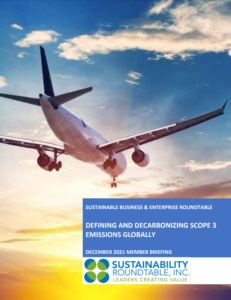This website uses cookies so that we can provide you with the best user experience possible. Cookie information is stored in your browser and performs functions such as recognising you when you return to our website and helping our team to understand which sections of the website you find most interesting and useful.
January 6, 2022
Summit for Sustainable Business VII Part 3 – Defining and Decarbonizing Scope 3 Emissions
 The Summit for Sustainable Business VII on December 10th devoted time to exploring the world of Scope 3 emissions, including current best practices for decarbonization. Jeff Meltzer, Director of Research and Consulting at SR Inc, and Julia Rothfield, Analyst, described changes in the new Net Zero Standard released in October by the Science-Based Targets Initiative (SBTi). Additionally, they dove into emerging opportunities for decarbonizing Scope 3 emissions, which are more thoroughly explored in SR Inc’s new Member Briefing on the topic. Member-Client speakers for this session included Jennifer Wright, Director of Global EHS & Sustainability at Biogen and Sean Kinghorn, Global Sustainability Leader at Intuit.
The Summit for Sustainable Business VII on December 10th devoted time to exploring the world of Scope 3 emissions, including current best practices for decarbonization. Jeff Meltzer, Director of Research and Consulting at SR Inc, and Julia Rothfield, Analyst, described changes in the new Net Zero Standard released in October by the Science-Based Targets Initiative (SBTi). Additionally, they dove into emerging opportunities for decarbonizing Scope 3 emissions, which are more thoroughly explored in SR Inc’s new Member Briefing on the topic. Member-Client speakers for this session included Jennifer Wright, Director of Global EHS & Sustainability at Biogen and Sean Kinghorn, Global Sustainability Leader at Intuit.
Key findings from this session and from our latest Member-Briefing include:
- The extent of Scope 3 emissions is on average 11x Scope 1 & 2, but varies considerably across companies and sectors.
- Committing to Science Based Targets (SBT) requires companies at a minimum to set a near-term, well-below 2oC goal for Scope 3 emissions in addition to a 1.5oC goal for Scope 1 & 2 emissions.
- SBTi has also defined a standard for achieving Net Zero emissions by additionally requiring long-term goals for Scopes 1, 2 & 3.
- Supplier engagement programs to reduce Scope 3 emissions today can reveal existing supplier progress and a baseline to help companies advance supplier emission reduction efforts.
- Aggregated procurements (e.g., the VPPA 2.0) for renewable energy offers a promising model for enabling significant supplier and customer emission reduction.
- Companies can strengthen brand reputation by embarking on bold Scope 3 and handprint initiatives to help customers, suppliers, and employees reduce their own footprint via companies’ product and service offerings.
Jennifer Wright, Director of Global EHS & Sustainability at Biogen, analyzed how Biogen’s existing company commitments – to go Fossil Fuel Free by 2040, reduce Scope 1&2 emissions 55% by 2032, and for 50% of suppliers to set their own SBTs by 2025 – fit into the new SBT Net Zero Standard. While Biogen’s current commitments meet the new SBT Net Zero guidance for near-term Scopes 1-3 targets and for a long-term Scope 1 & 2 target, Biogen will have to increase its ambition for a long-term Scope 3 target. Jennifer encouraged fellow executives to evaluate their major Scope 3 emissions categories and existing and planned programs for each to think through the implications and likelihood of meeting a new long-term Scope 3 SBT.
Sean Kinghorn, Global Sustainability Leader at Intuit, spoke about Intuit’s launch of the new Climate Action Marketplace to empower small businesses to understand and take action on their carbon footprints. Intuit has committed to help 1 million small businesses cut their GHG emissions 50% by 2030. Sean emphasized the importance of driving the climate conversation beyond each company’s four walls and determining how companies can use their unique superpowers to encourage positive climate action in Scope 3 and beyond.
We closed 2021 with a successful year of collaboration and innovation in the corporate sustainability space and look forward to another great year of advancing climate action in 2022! Our Symposia, Summit, and multi-member management best practice guidance and tools play a key role in advancing thought leadership and bringing together global executives for collaboration and innovation toward global emission reduction. Member-Clients can view our latest Member-Briefing on this topic in our cloud-based Digital Library.

